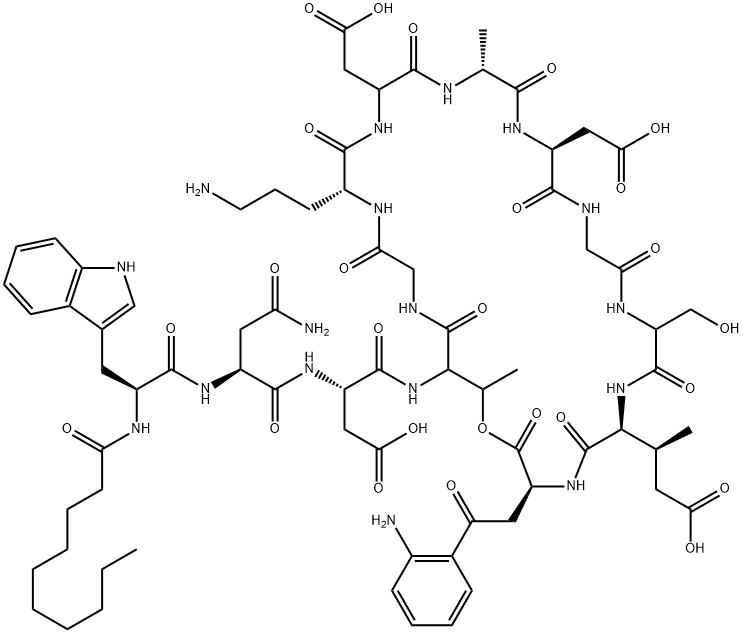1/1
Daptomycin
$ 1.00
/1KG
- Min. Order1G
- Purity98%
- Cas No103060-53-3
- Supply Ability100KG
- Update time2019-07-06

career henan chemical co
VIP8Y
 China
China
Since:2014-12-17
Address:Zhengzhou High tech Zone, Henan Province, China
Enterprise Verified
Business Bank account
Basic Contact Infomation
Business Address
Trade Company



Chemical Properties
| Product Name | Daptomycin |
| CAS No | 103060-53-3 |
| EC-No | |
| Min. Order | 1G |
| Purity | 98% |
| Supply Ability | 100KG |
| Release date | 2019/07/06 |
AD68
| Daptomycin Basic information |
| Antibiotic Antibacterial effect Toxicology Pharmacokinetics In vivo activity and clinical application Resistance Drug Interactions Uses |
| Product Name: | Daptomycin |
| Synonyms: | daptomycin;CUBICIN DAPTOMYCIN;Cidecin;Cubicin;Ly-146032;N-(N-Decanoyl-L-Trp-D-Asn-L-Asp-)cyclo[L-Thr*-Gly-L-Orn-L-Asp-D-Ala-L-Asp-Gly-D-Ser-[(3R)-3-methyl-L-Glu-]-3-(2-aminobenzoyl)-L-Ala-];N-[N-(1-Oxodecyl)-L-Trp-D-Asn-L-Asp-]-cyclo[L-Thr*-Gly-L-Orn-L-Asp-D-Ala-L-Asp-Gly-D-Ser-[(3R)-3-methyl-L-Glu-]-4-(2-aminophenyl)-4-oxo-L-Abu-];N-[N-Decanoyl-L-Trp-D-Asn-L-Asp-]-cyclo[Thr*-Gly-L-Orn-L-Asp-D-Ala-L-Asp-Gly-D-Ser-[(3R)-3-methyl-L-Glu-]-3-(2-aminobenzoyl)-L-Ala-] |
| CAS: | 103060-53-3 |
| MF: | C72H101N17O26 |
| MW: | 1620.68 |
| EINECS: | 1533716-785-6 |
| Product Categories: | Antibacterial;Intermediates & Fine Chemicals;Pharmaceuticals;Chiral Reagents;Heterocycles;API;VIREAD;Inhibitors |
| Mol File: | 103060-53-3.mol |
 |
|
| Daptomycin Chemical Properties |
| Melting point | 202-204?C |
| Fp | 87℃ |
| storage temp. | Store at -20°C |
| solubility | methanol: soluble5mg/mL |
| color | colorless to faint yellow |
| λmax | 260nm(EtOH)(lit.) |
| Merck | 14,2823 |
| Safety Information |
| RTECS | HB5626000 |
| Toxicity | LD50 i.v. in mice: 600 mg/kg (Debono) |
| MSDS Information |
| Daptomycin Usage And Synthesis |
| Antibiotic | Daptomycin is a kind of cyclic lipopeptide antibiotics with novel structure. It is extracted from the Streptomyces fermentation broth. It was discovered by Eli Lilly Company in the 1980s, and successfully developed in 1997 by Cubist Pharmaceuticals. It not only having a novel chemical structure but also has mode of action which is different from any antibiotic approved before: it inhibits cell by disrupting the transport of amino acids through cell membrane, thereby blocking the cell wall peptidoglycan biosynthesis and changing the nature of the cell membrane. It can destroy the bacterial cell membrane function in many aspects, and quickly kill gram-positive bacteria. In addition to the role of taking effect on most clinically relevant gram-positive bacteria, more importantly, Daptomycin has a potent efficacy in treating isolated strains which have shown signs of resistance to methicillin, vancomycin and linezolid. This property is of great clinical significance to patients suffering from severe infection. In September 2003, the US Food and Drug Administration had approved for the first time that daptomycin could be applied for the treatment of severe skin infections. In March 2006, it was approved for treating infectious diseases. In January 2006, it is approved by European Commission for the treatment of certain complicated skin and soft tissue infections caused by gram-positive bacteria. On September 6, 2007, Cubist Pharmaceuticals announced that the European Union has approved its antibacterial drug, Cubicin for the treatment of right heart endocarditis caused by Staphylococcus aureus infections and complicated skin and soft tissue infection related diseases caused by Staphylococcus aureus. On July 29, 2010, the US Food and Drug Administration (FDA) released information on the issue that intravenous injection of daptomycin (daptomycin, produced by Cubist Pharmaceuticals, with brand name “Cubicin”) may cause eosinophilic pneumonia in order to remind the patients and medical professionals. Eosinophilic pneumonia is a rare and very severe disease whose symptoms include fever, cough, shortness of breath and difficulty in breathing. |
| Antibacterial effect | Studies have shown that daptomycin has a similar antibacterial spectrum antibacterial with vancomycin which mainly has a strong inhibitory effect against Gram-positive bacteria, MIC of Staphylococcus spp: 0.125~0.5 μg/ml; MIC for gram bacterial spp: 0.06~0.5μg/ml; MIC for enterococci: 0.25~2.0 μg/ml. Daptomycin also has a broad antibacterial spectrum against Gram-positive anaerobic bacteria: MIC for Peptostreptococcus spp: 0.12μg/ml; MIC for Clostridium spp.: 0.5 μg/ml; MIC for Lactobacillus spp.: 1 μg/ml. Daptomycin has a good antibacterial activity on a variety of antibiotic-resistant bacteria, for example, the MIC for methicillin-resistant carbamoyl Staphylococcus (MRSA) is 0.06~0.5 μg /mL; MIC for methicillin-resistant Staphylococcus is 0.0625~1 μg/ml; MIC for oxacillin resistant strains of Staphylococcus is 0.12~0.5 μg/ml; MIC for highly aminoglycosides-resistant enterococci is 2.5μg/mL, MIC for GmrBIa-enterococci is 0.5~1 μg/mL; MIC for glycopeptide antibiotic-resistant enterococci is 1~2 μg /mL. |
| Toxicology | According to the information of Eli Lilly pharmaceutical laboratories, daptomycin is a relatively safe, low toxic antibiotic. LD 50 of Mouse is 142~159 mg/kg (Dog 200 mg/kg). It is non-lethal but can cause weight loss and loss of appetite; LD 50 of Monkey is 25~200 mg/kg. The main symptoms are lethargy, muscle weakness, ataxia, increase in creatinine phosphokinas, and slight irritation after skin and eye contact. With different dosage (25~125 mg/kg) of drugs being administrated (intravenously) to mice for a month, each dose group all exhibited the degeneration of both renal cortical tubular epidermis and skeletal muscle. It was also observed that sciatic nerve degeneration occurred at the dose group of 150 mg/kg dos. But It has no effect on fertility and also has no teratogenic effects. During six months of chronic toxicity test, the dog was intravenously injected with daptomycin at doses of 2, 10, 40 mg/(kg·d), respectively. Only the dogs at 40 mg /(kg·d) dose group exhibited a loss of knee jerk reaction and moderate degeneration of axonal and mild declining nerve transmission rate. But these functions can be recovered after the withdrawal for two weeks. A single around of dose at 2.0mg/kg has no effect on human muscles and nervous system. |
| Pharmacokinetics | Healthy volunteers were administrated (intravenous injection) of six different doses in the range of 0.5~6.0 mg/kg and 1.0 mg/kg 14C marked daptomycin, the results showed that daptomycin has a relatively long T1/2 in vivo (T1/2 = 6~8 h), a relatively small volume of distribution (V = 0.1~0.2 L/kg), and a renal clearance CLr of 0.17~0.2 ml/(min?kg). Daptomycin is mainly presented in the blood in the form of non-metabolized original drug with kidney as the major metabolic organ. About 78% of daptomycin is excreted in the urine. There are metabolites of daptomycin presented in the urine. The distribution pattern of daptomycin in the body is not fully understood. Patients of septicemia and endocarditis needs to subject to intravenous administration of daptomycin at a dose of 3mg/kg in every 12 h. Compared with healthy volunteers, people in daptomycin group had a average peak blood concentration (cmax): 35.45, which is lower than in healthy people. They also had an increased steady-state volume of distribution (Vss = 0.21) and a 22% increased clearance rate (CL). |
| In vivo activity and clinical application | This product is mainly used in the treatment of endocarditis, sepsis, peritonitis and urinary tract infections caused by Staphylococcus, Streptococcus, and Enterococcus. It is of particular importance in the treatment of endocarditis caused by various drug-resistant strains. Animal experiments showed that the application of daptomycin in treatment of endocarditis, peritonitis, pneumonia, and osteomyelitis caused by MRSA or other resistant strains caused by, yields a equivalent or even better effect than vancomycin. Moreover, daptomycin has a longer in vivo t1/2 long and has a smaller side effect and therefore it has considerable clinical value. In October 1990, it was reported about the first case of the failure of daptomycin in treatment of S. aureus-caused endocarditis which is likely due to the high affinity of daptomycin to the proteins (90%), the low dose of applied drug and different pharmacokinetic parameters of patients with healthy people. Deepened study of the pharmacology and clinical application of daptomycin is still ongoing. |
| Resistance | The incidence of the occurrence of daptomycin-resistant strains is low with only a mild resistance. In the in vitro selection of daptomycin-resistant strains from Streptococcus pneumoniae, Enterococcus, Staphylococcus, the incidence of drug-resistant strains of Streptococcus pneumoniae was the highest with 1.2 × 10-6 (16MIC) while Staphylococcus has the lowest incidence of drug-resistant strains which was only 7.0 × 10-9 (8MIC). General the MIC is only increased by 8 to 32 times. Using medium supplied no antibiotics for continuous passage of three generations can reduce the resistance ability to 1/2 to 1/4. In a rabbit model of endocarditis, after treatment of daptomycin, 13% of the rabbit produces daptomycin-resistance of Staphylococcus but with weakened resistance, indicating the stability of daptomycin resistance may involve multiple point mutations. The above information is edited by the Chemicalbook of Dai Xiongfeng. |
| Drug Interactions | Daptomycin has synergistic effect when used in combination with netilmicin, amikacin, imipenem, and fosfomycin. This can improve the antibacterial activity. Combination with teicoplanin, vancomycin has a good antibacterial activity against Sma GmrBla-enterococci. Combination of daptomycin with gentamicin also has synergistic effects on resistant glycopeptide antibiotics-resistant Streptococcus faecalis. This has been demonstrated in animal models. Combination of daptomycin and tobramycin for therapy can reduce the nephrotoxicity of the latter drug, which is just opposite with vancomycin. |
| Uses | Pharmaceutical intermediates, used in the treatment of concurrent skin and skin structure infections caused by a number of Gram-positive caused by susceptible strains. |
| Chemical Properties | Off-White to Light Yellow Solid |
| Uses | antiviral, RT inhibitor |
| Uses | Daptomycin is a member of the A 21978 complex of high molecular weight cyclic lipopeptides with potent antibiotic activity, notably against MRSA, VISA and VRSA bacterial strains. Originally isolated from Streptomyces roseosprous by Eli Lily in the 1980s, daptomycin was selected and developed by Cubist Pharmaceticals for human use. Daptomycin exhibits Ca-dependent depolarisation of the bacterial membrane resulting in loss of membrane potential leading to inhibition of DNA, RNA and protein synthesis which results in cell death. |
| Uses | immunosuppressant |
| Uses | Daptomycin is a member of the A 21978 complex of high molecular weight cyclic lipopeptides with potent antibiotic activity, notably against MRSA, VISA and VRSA bacterial strains. Originally isolated from Streptomyces roseosprous by Eli Lily in the 1980s, daptomycin was selected and developed by Cubist Pharmaceuticals for human use. Daptomycin exhibits Ca-dependent depolarisation of the bacterial membrane resulting in loss of membrane potential leading to inhibition of DNA, RNA and protein synthesis which results in cell death. |
| Uses | Cyclic lipopeptide antibiotic derived from a fermentation product of Streptomyces roseosporus; disrupts plasma membrane function in gram-positive bacteria. Antibacterial. |
| Definition | ChEBI: A polypeptide comprising N-decanoyltryptophan, asparagine, aspartic acid, threonine, glycine, ornithine, aspartic acid, D-alanine, aspartic acid, glycine, D-serine, threo-3-methylglutamic ac d and 3-anthraniloylalanine (also known as kynurinine) coupled in sequence and lactonised by condensation of the carboxylic acid group of the 3-anthraniloylalanine with the alcohol group of the threonine residue. |
Company Profile Introduction
Established in 2014,Career Henan Chemical Co. is a manufacturerspecializing in the sale of fine chemicals. Mainly deals in the sales of: Pharmaceutical intermediates OLED intermediates: Pharmaceutical intermediates; OLED intermediates;

